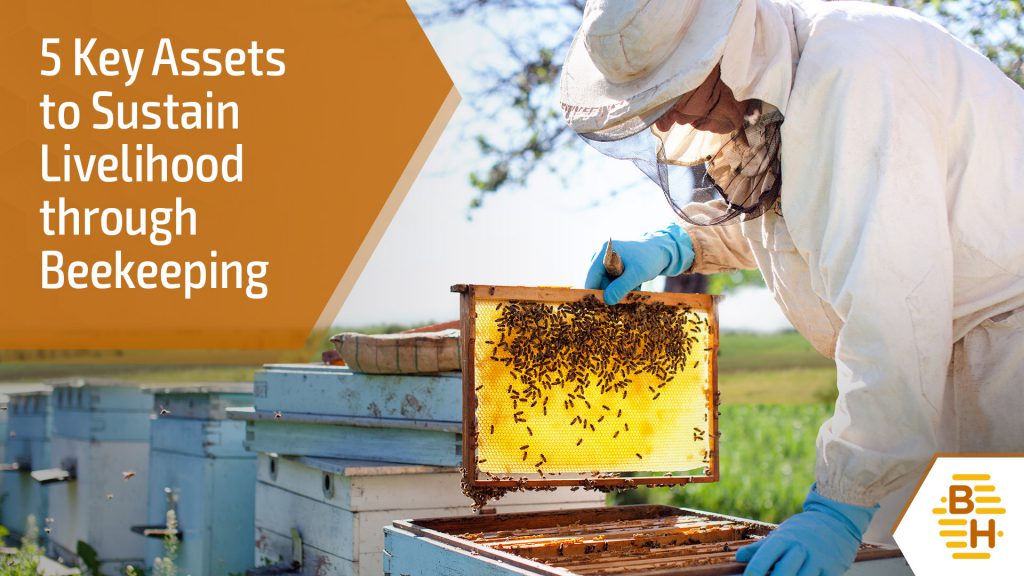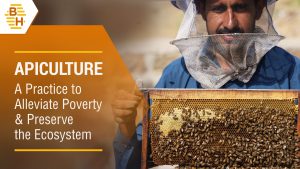In countries like India, Nepal, and Bhutan, farmers struggle with making a livelihood by relying on seasonal crops. A bad monsoon can cause them to lose earning of their whole year, leaving the survival of the farmers and their families in danger. To sustain a living, farmers indulge in activities like animal husbandry and fishing. One of such profitable and feasible activities is beekeeping. Beekeeping can generate a continuous income for such farmers considering that these countries are rich in the species of honeybees like Apis dorsata, Apis laboriosa), Apis cerana indica, Apis florea, Apis mellifera, and Tetragonula iridipennis. Apart from an economic alternative, beekeeping plays a crucial role in agricultural well-being and symbolizes the natural biological interdependence that comes from insects, pollination, and production of seed. To encourage beekeeping, small-scale efforts like beekeeping training can be witnessed across the world. As a result, it is aiding people to boost livelihoods and safeguard the maintenance of habitat and biodiversity. The reasonably low start-up costs, labor requirements, and minimum land ownership render beekeeping as an attractive economic option out of poverty for the rural people, particularly women and young people.
5 Primary Assets to Kick Start a Beekeeping Enterprise
To sustain livelihoods, access to types of assets is essential which falls into five categories: natural, human, physical, social, and financial. Beekeeping is a useful source of strengthening livelihoods as it uses and creates a range of assets. Successful beekeeping can generate various capital assets although the unavailability of financial capital does not hinder in starting a productive beekeeping enterprise. Let’s discuss the 5 key assets that are crucial in developing a beekeeping enterprise to sustain livelihoods.
Natural Capital Assets
Beekeeping livelihoods are built upon natural resource stocks like bees, flowering plants, and water. Bees are considered a natural resource, and liberally available in the wild. In places where bees have not been poisoned, damaged, or harmed, they will collect wherever they are given the natural conditions including the availability of flowering plants. Beekeeping is possible in barren areas and places where crops or other enterprises have failed, which makes beekeeping a desirable option in marginal conditions.
Human Assets
Most societies have considerable traditional knowledge and skills about bees, honey, and related products that they have developed and refined with time. Beekeeping products are often made by women. For instance, the honey wine industry in Ethiopia is run by women, whilst in Africa, women brew and sell honey beer. Such human assets or skills play a major role in creating livelihoods within a society. The best beekeeping training projects recognize existing skills and build on them for greater income generation that guarantees sustainability.
Physical Assets
Successful beekeeping enterprises require beekeeping tools and equipment and infrastructure that includes transport, water, energy, roads, communication systems, and buildings. There are numerous methods to manage bees and obtain crops of honey, beeswax, or other products. Sustainable beekeeping projects that promote all beekeeping tools and equipment made and mended locally contribute majorly to the livelihoods of other local people too.
Social Assets
For a continually growing beekeeping enterprise, social resources such as networks of marketing associations have great significance. Through local associations, beekeepers can improve their craft, lobby for the protection of bees, organize collective processing for honey and wax, and gain access to markets. Also, access to wider networks through non-governmental organizations (NGOs) helps beekeepers to engage in national and international contacts, find sources of training, markets, new research results, as well as improve their understanding of the industry.
Financial Assets
Although significant financial assets are not vital to begin beekeeping activities at subsistence level, they are essential for the development of beekeeping enterprises. Successful marketing depends on adequate supplies of containers for processing and packaging. Also, credit is necessary for beekeeping enterprises to run collection centres and for traders to buy honey in bulk and beeswax.
Supporting Agricultural Livelihoods through Beekeeping
Across the world, beekeeping is especially valuable where it is an activity that is possible for people living in the worst circumstances as bees are almost always available and equipment can be made from whatever materials are at hand. BeeHively Group realizes the importance of honeybees for both humans and the environment. Thus, it encourages sustainable ways of procuring honey. BeeHively Group is actively involved in beekeeping training for harvesting honey from natural hives in the forests. It also trains the new and emerging beekeepers or farmers looking to foray into the beekeeping business. The group works with tribal beekeepers and apiculturists to deliver natural and organically sourced raw honey to customers around the world. Extracting honey requires training and practice. Know more about BeeHively Group’s training programs that propagates sustainability at https://www.beehivelygroup.com/beekeeping-education-services/




